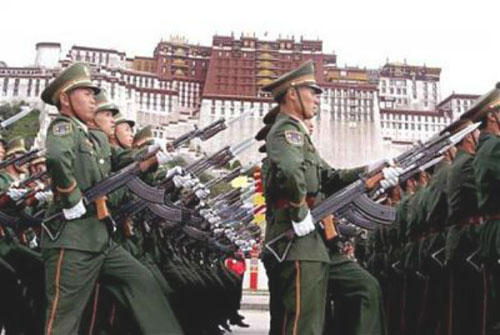by WorldTribune Staff, September 7, 2020
Chinese supreme leader Xi Jinping is seeking to destroy Tibet’s unique national identity by demanding Buddhists comply with the Chinese Communist Party’s political mandates, the leaders of Tibet’s India-based government in exile said.

“Tibetan Buddhism should be guided in adapting to [China’s] socialist society and should be developed in the Chinese context,” Xi said on Aug. 29 at the 7th Central Symposium on Tibet held in Beijing.
Xi’s demand that Tibet’s centuries-old faith be Sinicized are misguided and unrealistic, said Lobsang Sangay, political leader, or Sikyong, of Tibet’s exile Central Tibetan Administration.
“For Tibetans, Buddhism is more important than communism,” Sangay said, calling Beijing’s attempt to raise China’s political system over the Tibetan people’s faith “a violation of international religious freedom.”
Xi’s call for the Sinicization of Buddhism signals a “doubling down” of communist China’s current hard-line and repressive policy in Tibet, said Pema Jungney, speaker of Tibet’s exile parliament, adding, “I can’t interpret it any other way.”
“They are determined to wipe Tibet’s history from the face of the earth,” Jungney said.
China is now establishing Communist Party structures in all areas of Tibet “to strengthen their command, policies, and power, thus suppressing all the freedoms of Tibetans in the spheres of faith and belief, politics, the economy, and culture,” Jampel Monlam, a Boston-based Tibet analyst and former director of the Tibetan Center for Human Rights and Democracy, told Radio Free Asia.
“If these policies of China’s continue much longer, I worry about what will happen to Tibet,” Monlam said.
Sangay said that the “Sinicization of Tibetan Buddhism is never going to work. The last 60 years of Chinese rule in Tibet is a testament to that fact.”
Chinese authorities also “interfere with Tibet’s traditional recognition of senior Buddhist monks and other religious leaders in order to install politically compliant figures of their own choosing,” Radio Free Asia reported.
Sangay noted that “the root cause of instability in Tibet is not the Tibetan people’s faith, but the repressive and failed policies of the Chinese government. The continuation of these hard-line policies and repression is only going to make matters worse.”
“Yet the determination of the Tibetan people inside Tibet is still strong, and [they remain] faithfully devoted to His Holiness the Dalai Lama,” Sangay said.
Intelligence Brief __________ Replace The Media
